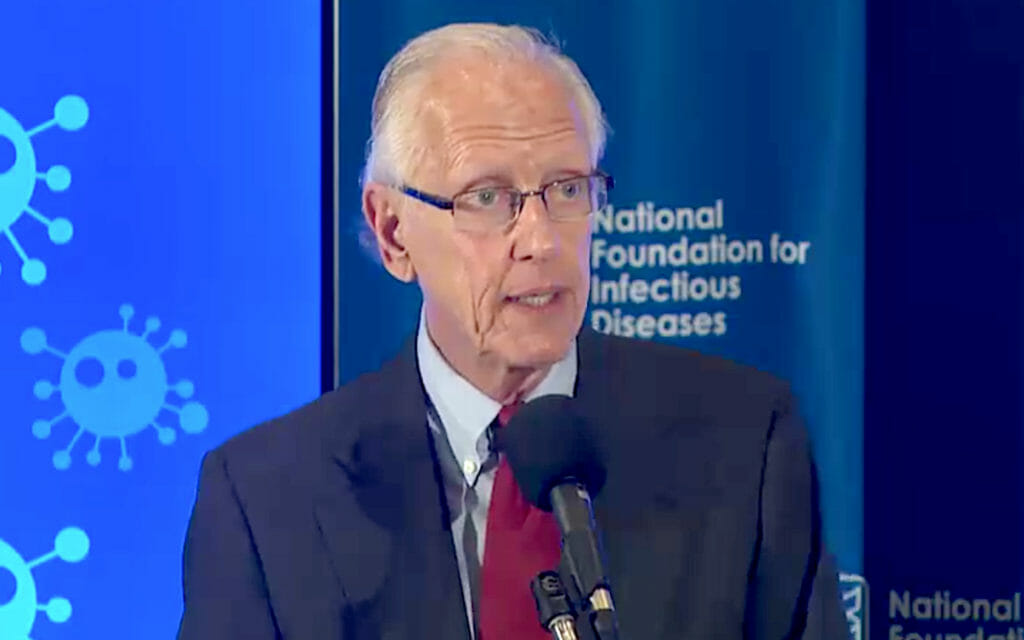“I would hope that everyone who’s in assisted living and everybody who works in the facilities, as well as everyone age 65 and older, be vaccinated against influenza. It’s the single best thing we can do to prevent and mitigate the impact of that disease,” William Schaffner, M.D., medical director of the National Foundation for Infectious Diseases, said to me.
Schaffner and I were speaking on the phone a day or two before a press conference that his organization holds every year to reiterate the importance of flu vaccination, especially among people at high risk for flu-related complications — such as older adults and those with chronic conditions — and those who spend a lot of time around vulnerable adults — such as those who work in senior living communities, and residents’ family members.
The NFID recommends that everyone get vaccinated against the flu by the end of October.
“For people age 65 and older, there are two vaccines that are licensed specifically for this age group, because they work better,” said Schaffner, who also is a professor of preventive medicine and infectious diseases at Vanderbilt University School of Medicine. “It’s the high-dose vaccine and a vaccine with an adjuvant, or immune stimulant, in it. Both these vaccines — the data are very good — have been shown to provide better protection for people age 65 and older.”
Here are some other important takeaways from my conversation with the good doctor and this year’s press conference.
The flu vaccine makes things better. “The influenza vaccine is not a perfect vaccine. It’s not,” Schaffner said. “It cannot prevent each and every influenza infection. However… even if you get the vaccine and get infection and you become ill, your illness is very likely to be less severe. It’ll be shorter, and you’re much less likely to get the complications of pneumonia, having to be hospitalized and, frankly, dying. So it shifts everything in our favor, and all of us need as much help as we can get.”
Vaccination among adults aged 65 or more years has plateaued. “People 65 and older account for a majority of the flu deaths and hospitalizations we see each season. Yet still, last season, 32 percent of people in that age group did not get vaccinated,” Secretary of Health and Human Services Alex M. Azar II said at the press conference.
Long-term care workers, including those in assisted living, have a low vaccination rate compared with others in healthcare. “Only 68 percent of long-term care workers got vaccinated” last year, Azar said. “Many of them work with patients who are at the highest risk of serious flu complications.”
Supervisor enthusiasm and no-cost flu shots are two ways that long-term care workplaces can increase the likelihood that employees will get vaccinated.
“We’re asking them to be vaccinated not only to protect themselves, but really to protect the patients” and residents, Schaffner said. Senior living communities and nursing homes should require vaccination of their employees, as is commonplace for hospitals, and should provide it at no cost, he said.
“That’s part of the cost of doing business for those enterprises,” Schaffner said. “And if you have people who work only on the weekends or come in on the night shift, you have to provide it while they are there. You can’t ask them to come in extra.”
Don’t forget pneumococcal vaccination. “Each year in the United States, more than 2 million people get pneumococcal disease, and over 6,000 of them die, with most of those deaths among adults aged 65 years and older,” Azar said. The Centers for Disease Control and Prevention, he said, recommends pneumococcal vaccination for everyone aged 65 or more years and for adults with weakened immune systems, who have certain chronic health conditions, or who smoke cigarettes.
“There are two vaccines, and some people should get both vaccines, whereas others need only get one,” Schaffner told me, adding that people’s healthcare providers can determine which category individuals fall into. “Pneumococcal pneumonia is one of the principal complications of influenza, so [the pneumococcal vaccine] kind of provides double protection,” he said.
If you get the flu, do these things to stay healthy. Stay home if you’re sick, avoid people who are sick, and always practice good hygiene — wash your hands often, and cover coughs and sneezes. “Last but not least, take flu antiviral drugs if your doctor prescribes them,” Azar said. “Those who are very sick and those who are at high risk of serious flu complications need to get treated quickly. Taking antivirals early, if you are sick, can shorten your illness, make it less severe, and prevent more serious outcomes.”




